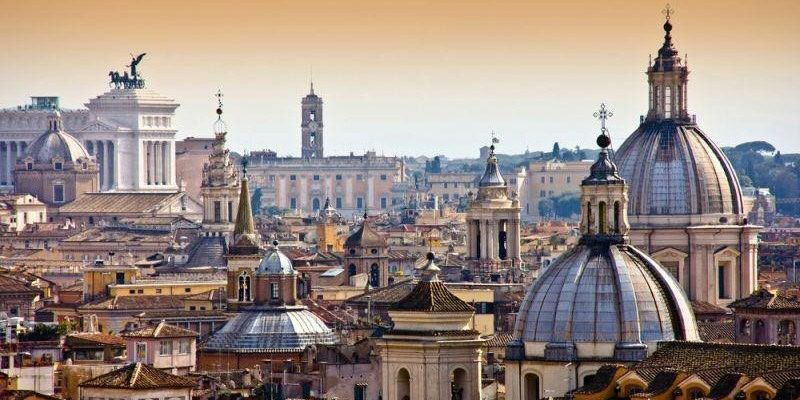COURSES

The World in Rome. Global perspectives on culture, politics, science & society
Are you fascinated with phenomena of intercultural exchange and international co-operation? Then this Summer school in Rome might be the thing for you. The programme will feature lectures by specialists from various disciplines and excursions to many different sites in Rome. Students will actively engage in discussions and deliver an on-site presentation.
About the course
Content
Rome fascinates for at least two reasons. Firstly, because its millennial history as a real and perceived ‘centre of the world’ provides numerous examples of international networks or communities, either religious, artistic, political and diplomatic, or scientific. Secondly because Rome still lives up to its appellation ‘caput mundi’. Partly thanks to its symbolic value, it is still today a unique cross-cultural ‘hub’, presenting a fascinating window to our globalized world. These historical and contemporary dimensions have many lessons to teach, about respectful international collaboration and fruitful intercultural dialogue, but also about rivalries, conflict, abuse and oppression.
As a unique gateway to this theme, a crucial role in this course is to be played by the foreign academies and institutes in Rome. In their capacity of bridges between tradition and modernity, and between national and supranational perspectives, they form one of the primary subjects of investigation.
The course offers a unique opportunity to get to know Rome as an international hub in past and present; learn about relevant academic concepts and discourse, and – last but not least – to personally experience intercultural exchange and international cooperation in a highly diverse group of staff and students.
Learning outcomes
After this course you will be able to:
- Obtain general familiarity with the main historical developments of the city of Rome from the early modern age to the present, in particular concerning (traces of) foreign presences in Rome.
- Become acquainted with different disciplinary approaches, concepts and discourse relating to intercultural exchange and international cooperation; apply these to a case study, either historical or modern.
- Collaborate effectively within a diverse team on research about a specific object, monument, location or institution in the city of Rome, deploying different methods (e.g. textual and visual analysis, interviews, fieldwork).
- Communicate the outcomes of this research to an audience with a general academic background in an oral presentation; receive and process feedback.
Programme
The total study load is 5 ECTS, consisting of:
- Independent study of course material and preparatory assignment: 1 ECTS (28 hours).
- Intensive summer school programme in Rome (12 days): active participation in excursions and discussions, preparations, oral presentation: 3 ECTS (84 hours).
- After the summer school, concluding personal reflection: 1 ECTS (28 hours)
Topics include: (subject to alterations)
- From the Grand Tour and Bildungsreise to present-day mass tourism
- Sites of national communities (neighbourhoods, churches, monuments)
- Foreign academies, cultural institutes and universities, ca 1800-today
- International Relations on the Silver Screen: Cinecittà' vis-à-vos Hollywood.
- The Vatican and its institutions as global agents; Rome as a center of multilingualism
- Rome as a hub of a triple international diplomacy (Treaty of Rome 1957; UN WPF)
- The 1911 and 1942 World Fairs
- 1960 Summer Olympic Games
Assessment
Assessment takes place on the basis of preparatory study and assignment of course material (30%), active participation, oral presentation (40%), and the concluding reflection (30%).
Upon successful completion of the programme, the Summer School offers a Certificate of Attendance that mentions the workload of 140 hours (28 hours corresponds to 1 ECTS). Students can apply for recognition of these credits to the relevant authorities in their home institutions, therefore the final decision on awarding credits is at the discretion of their home institutions. We will be happy to provide any necessary information that might be requested in addition to the certificate of attendance.
In addition to the Certificate of Attendance, an ENLIGHT edubadge will be issued, providing participants a life-long digital proof of attendance and completion of the programme.
Lecturers
(some to be confirmed)
- Dr. B. Martin (Uppsala University)
- Prof. dr. A. O’Connor (University of Galway)
- Prof. dr. J. Orbie (Ghent University)
- Dr. A. Pelgrom (University of Groningen)
- Prof. dr. E. Sterken (University of Groningen)
- Prof. dr. J. Tancer (Comenius University Bratislava)
- and guest lecturers from Rome
Our partners
- Royal Netherlands Institute in Rome
- Academia Belgica
- Swedish Institute Rome
How to apply?
The course is open to students from all disciplines. Main target group are (advanced) undergraduate students, however graduate students are also invited to apply. In the latter case, students are responsible for obtaining prior approval of their home Board of Examiners (in view of recognition of credits).
Selection of students will be carried out by the Summer school coordinators. About the outcome, no correspondence will be entered into. The selection process will take into account that the group of participants is as diverse as possible (home universities, disciplinary backgrounds etc).
There is a fee of 350€ for ENLIGHT students. The fee includes lodging in Rome, 1 welcoming dinner and entrance fees for excursions. It does not include travel costs to and from Rome, local transport and personal expenses, such as meals.
Minimum requirement: 2nd year Bachelor students with nominal study progress at the time of application.
It is expected that the participants have a sufficient command of the English language to actively participate in the discussions and to present their own work in English.
To apply, kindly fill out the online application form by 15 April 2024. Please note that you will be asked to upload the following documents:
- Curriculum Vitae (max. 2 pages)
- Motivation letter, clearly stating why you want to join this summer school, what you will bring to the school and what you hope to learn (max. 1 page)
- Transcript of records (grade list)
Contact